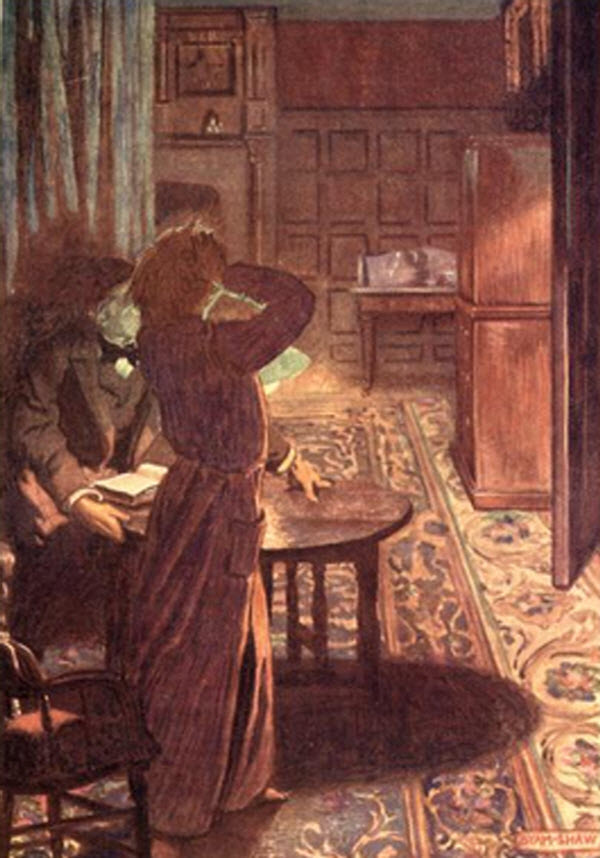The Fall of the House of Usher by Edgar Allan Poe
Table Of Content

I learned, moreover, at intervals, and through broken and equivocal hints, another singular feature of his mental condition. Shaking off from my spirit what must have been a dream, I scanned more narrowly the real aspect of the building. Its principal feature seemed to be that of an excessive antiquity. Minute fungi overspread the whole exterior, hanging in a fine tangled web-work from the eaves. No portion of the masonry had fallen; and there appeared to be a wild inconsistency between its still perfect adaptation of parts, and the crumbling condition of the individual stones. In this there was much that reminded me of the specious totality of old wood-work which has rotted for long years in some neglected vault, with no disturbance from the breath of the external air.
Madeline Usher
Soon, Roderick posits his theory that the house itself is unhealthy, just as the narrator supposes at the beginning of the story. ‘The Fall of the House of Usher’ is probably Edgar Allan Poe’s most famous story, and in many ways it is a quintessential Gothic horror story. We have a mysterious secret afflicting the house and eating away at its owner, the Gothic ‘castle’ (here, refigured as a mansion), premature burial (about which Poe wrote a whole other story), the mad owner of the house, and numerous other trappings of the Gothic novel.
Characters
Roderick Usher prophecies his death to the narrator in the manner it really occurs. However, it is worth noting that the death of Roderick is another literal fall. The idea of fear is worse for Roderick Usher than the object he fears. One can interpret the last action in a way that fear of any occurrence manifests it in real life. Much of the apparent madness in the story does not appear to be due to supernatural elements. Considering this, one can interpret that Roderick does not bury his sister alive, but she is back from the dead.
Episodes
Beyond this indication of extensive decay, however, the fabric gave little token of instability. Perhaps the eye of a scrutinizing observer might have discovered a barely perceptible fissure, which, extending from the roof of the building in front, made its way down the wall in a zigzag direction, until it became lost in the sullen waters of the tarn. No sooner had these syllables passed my lips, than—as if a shield of brass had indeed, at the moment, fallen heavily upon a floor of silver became aware of a distinct, hollow, metallic, and clangorous, yet apparently muffled reverberation. The antique volume which I had taken up was the “Mad Trist” of Sir Launcelot Canning; but I had called it a favourite of Usher's more in sad jest than in earnest; for, in truth, there is little in its uncouth and unimaginative prolixity which could have had interest for the lofty and spiritual ideality of my friend.

Shaking off from my spirit what must have been a dream, I scanned more narrowly the real aspect of the building. Perhaps the eye of a scrutinising observer might have discovered a barely perceptible fissure, which, extending from the roof of the building in front, made its way down the wall in a zigzag direction, until it became lost in the sullen waters of the tarn. With this foreboding introduction, we enter the interior through a Gothic portal with the narrator. With him we encounter Roderick Usher, who has changed drastically since last the narrator saw him. His cadaverous appearance, his nervousness, his mood swings, his almost extrahuman sensitivity to touch, sound, taste, smell, and light, along with the narrator’s report that he seems lacking in moral sense, portrays a deeply troubled soul.
How did Lenore, Madeline, and Roderick all die?
Ruth Codd (the highlight of The Midnight Club) plays Roderick’s much younger wife Juno, a former heroin addict whose life was turned around thanks to the drugs the Ushers peddle, while Rahul Kohli, Henry Thomas and Kate Siegel each take on a dastardly member of the Usher brood. Alongside his favoured players is Mark Hamill as an unfeeling lawyer/fixer for the Usher family who sounds as if he gargles a pint of nails every morning. But as we know from the start, there’s no point in getting overly attached to them, as grisly fates are assured for all.
Edgar Allan Poe
Fall of the House of Usher: Is Mike Flanagan's Poe adaptation as scary as his other Netflix shows? - Slate
Fall of the House of Usher: Is Mike Flanagan's Poe adaptation as scary as his other Netflix shows?.
Posted: Tue, 10 Oct 2023 07:00:00 GMT [source]
It’s not so much the “what” as the “why” that the audience and Dupin need to be answered. Upon my entrance, Usher arose from a sofa on which he had been lying at full length, and greeted me with a vivacious warmth which had much in it, I at first thought, of an overdone cordiality—of the constrained effort of the ennuyé man of the world. The now ghastly pallor of the skin, and the now miraculous lustre of the eve, above all things startled and even awed me. The silken hair, too, had been suffered to grow all unheeded, and as, in its wild gossamer texture, it floated rather than fell about the face, I could not, even with effort, connect its Arabesque expression with any idea of simple humanity. “The Fall of the House of Usher” updates the work of Edgar Allan Poe for the era of Big Pharma, turning his most famous tales into a sprawling story of the decline of a wealthy American family.

Storyline
Every episode includes flashbacks to a young Roderick (Zach Gilford), Madeline (Willa Fitzgerald), and Annabel Lee (Katie Parker), Roderick’s first wife. These fill in how the Ushers made their fortune, but they’re kind of a narrative drag. It’s important that Roderick and Madeline are cruel, selfish creatures—less so how they got that way. What’s more interesting is to watch how the fallout of their decisions fell on Roderick’s many children, all torn apart by some of Poe’s most memorable creations. Late one stormy night, Roderick Usher (Bruce Greenwood) invites an investigator named C.
Log in or Create account
He yells that Madeline is standing behind the door, and when the door opens with the storm, she is standing. Even at the beginning of the story, Roderick claims that he will die because of fear, and he does indeed die because of fear. The short story “The Fall of the House of Usher” shows a split-personality disorder in a dramatized way. The tale explores the various aspects of identity and the means through which these aspects could possibly be fractioned. The story emphasized the difference between the mental and physical parts and how these parts interact with each other. He is a bookish and intellectual man while his sister is sick and bedridden.
Who Is Verna? 'The Fall Of The House Of Usher' Character Explained - Women's Health
Who Is Verna? 'The Fall Of The House Of Usher' Character Explained.
Posted: Thu, 19 Oct 2023 07:00:00 GMT [source]
Once Roderick and Madeline were the only ones left in the bar after a long night of drinking, Verna revealed to the twins that she knew what they had done. But, if they agreed to her terms, she could guarantee that they would not only get away with Rufus' murder but also rise to control Fortunato's billion-dollar painkiller empire and never be convicted of a single crime. Roderick Usher is a gifted poet and artist, whose talents the narrator praises before sharing a poem Usher wrote, titled ‘The Haunted Palace’.
Feeble gleams of encrimsoned light made their way through the trellissed panes, and served to render sufficiently distinct the more prominent objects around; the eye, however, struggled in vain to reach the remoter angles of the chamber, or the recesses of the vaulted and fretted ceiling. The general furniture was profuse, comfortless, antique, and tattered. Many books and musical instruments lay scattered about, but failed to give any vitality to the scene. An air of stern, deep, and irredeemable gloom hung over and pervaded all. It's through this framework—Roderick telling stories to Dupin—that we learn just about everything that has happened to the present point. We learn about the violent and untimely deaths of each of Roderick's children—whether from Annabel Lee (Katie Parker) or "bastards"—and how in every case, it was their own failings that led to their demise.
The narrator tells the readers the term “The House of Usher” refers to the house and the family dwelling in the house and the Usher bloodline. The title does not only refer to the literal fall of the house but also to the fall of the Usher family with the death of Roderick Usher. The narrator mentions that Roderick and his sister Madeline are the only two surviving family members, so their death makes the death of the family line. One can assume that Roderick can see the future with his lustrous and magical eyes. He is aware of the upcoming events, and he speaks about them before. One can also assume that Roderick causes the things to happen; that is why he is preoccupied with the fear that he manifests in reality.
As soon as he escapes, the house of Usher cracks and crumbles to the ground. Like the narrator of the story of “Tell-Tale Heart,” the hyperactive senses of Roderick Usher are inflamed by his disease. Even though the illness is displayed physically, it is based on the moral and mental state of Roderick Usher. His sickness is suggestive because he is expected to be sick based on the illness in his family’s history. Moreover, he buries his sister alive to fulfill his self-creating prophecy.
Auguste Dupin (Carl Lumbly), to come hear his confession following the deaths of all six of his adult children (by five different mothers)—Frederick (Henry Thomas), Tamerlane (Samantha Sloyan), Victorine (T'Nia Miller), Napoleon (Rahul Kohli), Camille (Kate Siegel), and Prospero (Sauriyan Sapkota)—in the span of a week. From the start of the first episode of The Fall of the House of Usher, we know that all of Roderick Usher's children are dead. It's the how and the why of their deaths that plays out over the course of Mike Flanagan's new horror anthology series, now streaming on Netflix.
An excited and highly distempered ideality threw a sulphureous lustre over all. Among other things, I hold painfully in mind a certain singular perversion and amplification of the wild air of the last waltz of Von Weber. By the utter simplicity, by the nakedness of his designs, he arrested and overawed attention. For me at least — in the circumstances then surrounding me — there arose out of the pure abstractions which the hypochondriac contrived to throw upon his canvass, an intensity of intolerable awe, no shadow of which felt I ever yet in the contemplation of the certainly glowing yet too concrete reveries of Fuseli. The disease of the lady Madeline had long baffled the skill of her physicians. A settled apathy, a gradual wasting away of the person, and frequent although transient affections of a partially cataleptical character, were the unusual diagnosis.

Comments
Post a Comment